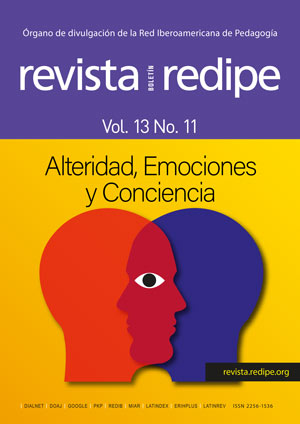Some radical errors in our Education
Main Article Content
Keywords
Education, Radical mistakes, Radical and inclusive approach to education, Pedagogy, General Didactics, Training, Teaching
Abstract
Our education is incomplete, partial and externalizing. It is polarized in what is external to the person, although it is called ‘interior’, and coincides mostly with what globalized educational systems, societies and States demand. The objective of this work is to investigate the current and possible pedagogical reality in the opposite way to how it is usually done: instead of focusing on the search for improvement and necessary changes, we will try to approach what is insufficient, poorly constructed, poorly done or not done. To respond to the objective, the methodology will be the pedagogical essay supported by the “radical and inclusive approach” (Herrán, 2014). The essay is considered the most necessary research methodology, insofar as it can contribute to the relationship and openness, intimate fibers of innovation or creativity applied in social contexts. Its content can be considered innovative and oriented to pedagogical change, although it differs from the usual notion of educational change (v. g. Fullan, 2012, 2020; Fullan & Hargreaves, 1992), as it responds to a radical change of what is normally understood by educational change in Pedagogy and General Didactics (Herrán, 2013). The results will be identified with the content of the trial, although specifically in different errors or inadequacies identified. They concern, in a special way, those responsible for educational research and pedagogical training of educators. The aim of the study is to contribute to the performance (passage from ‘bad’ to ‘less bad’ situations) of education, training, teaching and curricula, to aspire, in the future, to an evolutionary improvement. It is hoped that what follows may have some impact on the research, professional and social transfer that takes the school and society as a reference. The work is developed within a framework of pedagogical renewal that affects, in general, the Educational Sciences and Pedagogy and General or polyvalent Didactics, the latter being understood as a discipline “at the core of Pedagogy” (Sevillano, 2011). Its developments can be included, primarily or nuclearly, in General Didactics -inseparately from Pedagogy-, to the extent that this discipline “is concerned with critically analyzing the major currents of didactic thought and the predominant trends in contemporary teaching” (Alves de Mattos, 1960, p. 30). We understand that the study meets the criteria of excellence of the European Research Council (2024), namely: it is a highly innovative research proposal, with some risk, seeks to acquire knowledge at the limit of what has been experienced so far and proposes new theories or methodologies.
References
Alves de Mattos, L. (1960). Compendio de Didáctica General. Kapelusz.
Arboleda, J. C. (2024). Educación consciente, otredad y ciudadanía digital. Revista de la Red Iberoamericana de Pedagogía,12(7),13-5. https://doi. org/10.36260/rbr.v12i7.1979
Buda (1997). Dhammapada o las enseñanzas de Buda. FCE.
Cebes (1995). Tabla. Disertaciones. Fragmentos. Gredos.
Comenio (1984). Didáctica magna. Akal.
Confucio (1969). Los libros canónicos chinos. Bergua.
Dewey, J. (1910). How we think. Heath.
Eddington, A. S. (1930). The nature of the physical world. Cambridge University Press.
Einstein, A. (1920). Relativity: The Special and the General Theory. Henry Holt and Company.
Fromm, E. (1991). Del tener al ser. Caminos y extravíos de la conciencia. Barcelona: Paidós
Fullan, M. (2012). Los nuevos significados del cambio en la educación. Barcelona: Octaedro.
Fullan, M. (2020). Liderar en una cultura de cambio. Morata.
Fullan, M., & Hargreaves, A. (1992). Teacher development and educational change. Falmer Press.
García Gual, C. (2018). Los Siete Sabios (y tres más). Alianza.
Hermes Trismegisto (1983). El Kybalión. Estudio sobre la filosofía hermética del antiguo Egipto y Grecia. EDAF.
Herrán, A. de la (1995). Ego, autoconocimiento y conciencia. Tres ámbitos en la formación básica y la evolución personal de los profesores. Tesis doctoral. Facultad de Educación. Centro de Formación de Profesorado. Universidad Complutense de Madrid. https://eprints.ucm.es/id/ eprint/3794/
Herrán, A. de la (1997). El ego humano: del yo existencial al ser esencial. San Pablo.
Herrán, A. de la (1998a). Cómo estudiar en la universidad. Didáctica y práctica de un tema transversal universitario. Universitas.
Herrán, A. de la (1998b). La conciencia humana. San Pablo.
Herrán, A. de la (2004a). El autoconocimiento como eje de la formación. Revista Complutense de Educación, 15(1), 11- 50. Recuperado de https://revistas.ucm. es/index.php/ RCED/article/viewFile/ RCED0404120011A/16270
Herrán, A. de la (2004b). Teoría de los Sistemas Evolucionados: Hacia las Organizaciones que Maduran. Tendencias Pedagógicas (9), 71-109. https://repositorio.uam.es/ bitstream/handle/10486/4800/31507_ 2004_09_03.pdf
Herrán, A. de la (2006b). Los estados de conciencia: Análisis de un constructo clave para un enfoque transpersonal de la didáctica y la formación del profesorado. Tendencias Pedagógicas (11), 103-154. https://revistas.uam.es/ tendenciaspedagogicas/article/view/1869
Herrán, A. de la (2008). Hacia una Educación para la universalidad: Más allá de los ismos. En J. Valle (Coord.), De la identidad local a la ciudadanía universal: el gran reto de la educación contemporánea (pp. 209-257). Fundación para la LibertadUniversidad Autónoma de Madrid. http://radicaleinclusiva.com/wp-content/ uploads/2018/01/haciaunaeduniv.pdf
Herrán, A. de la (2009). Educación de la humanidad: El reto de una nueva Pedagogía. En M. Almendro (Coord.), Krisis (pp. 177-198). La Llave.
Herrán, A. de la (2011). ¿Más allá del profesor reflexivo y de la reflexión sobre la práctica? En A. Medina, A. de la Herrán, & C. Sánchez (Coords.), Formación pedagógica y práctica del profesorado (pp. 117-152). Ramón Areces. http:// radicaleinclusiva.com/wp-content/ uploads/2018/01/masallaprofreflex.pdf
Herrán, A. de la (2011a). La madurez institucional como constructo pedagógico. En E. Sebastian Heredero y M. Martin Bris, Transferencia del conocimiento a partir de prácticas educativas en los contextos español y brasileño (pp. 145- 163). Alcalá de Henares: Universidad de Alcalá. http://radicaleinclusiva. com/wp-content/uploads/2019/04/Lamadurez-institucional-como-constructopedag%C3%B3gico.pdf
Herrán, A. de la (2011b). Indicadores de madurez institucional. Revista Iberoamericana de Estudos em Educaçao, 6(1), 51-88. http://seer.fclar.unesp.br/ iberoamericana/article/view/4799
Herrán, A. de la (2013). Reflexiones sobre el cambio del cambio en Pedagogía. Un enfoque radical. Matices del Posgrado Aragón. Universidad Nacional Autónoma de México (20), 5-24 http:// radicaleinclusiva.com/wp-content/ uploads/2018/01/cambpedagradical.pdf
Herrán, A. de la (2014). Enfoque radical e inclusivo de la formación. REICE: Revista Electrónica Iberoamericana sobre Calidad, Eficacia y Cambio en Educación, 12(2), 163-264. https://www. redalyc.org/pdf/551/55130462008.pdf



